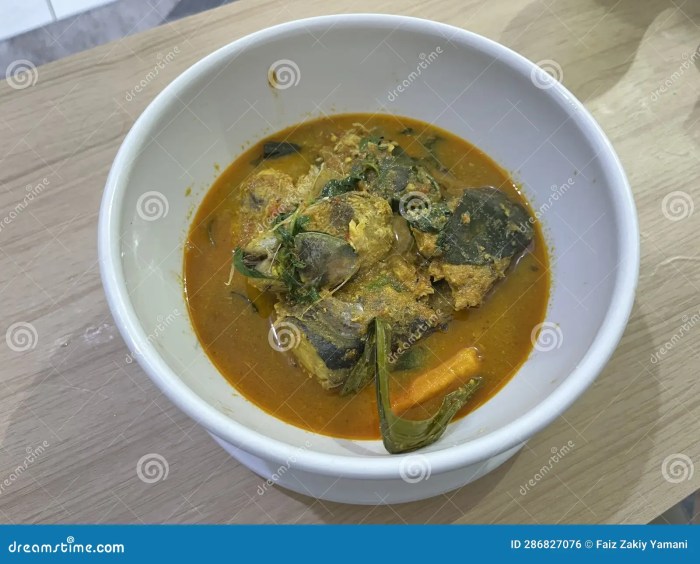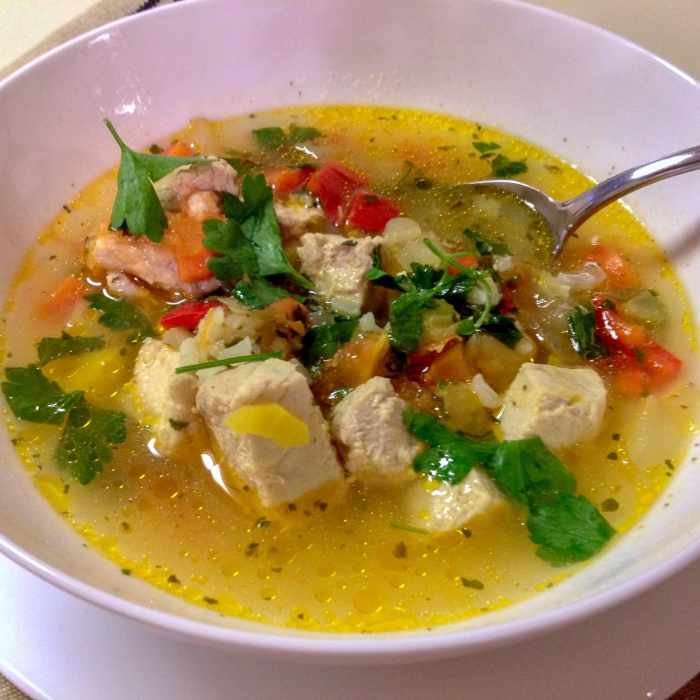Tuna Fish Soup Recipe Variations
Tuna fish soup recipe – This section explores three delicious variations of tuna fish soup: creamy, clear broth, and spicy. Each version offers a unique flavor profile and textural experience, catering to diverse palates. We’ll detail the ingredient lists, taste differences, and nutritional information for each.
Three Tuna Fish Soup Variations
The following recipes showcase the versatility of tuna fish soup. The differences lie primarily in the base, additions, and spices used.
Creamy Tuna Fish Soup: This version offers a rich, indulgent experience. The creamy texture comes from the addition of milk or cream, creating a luxurious mouthfeel.
- Ingredients: Canned tuna in water (2 cans), milk or cream (1 cup), potatoes (2 medium, diced), carrots (1 medium, diced), celery (1 stalk, diced), onion (1/2, chopped), butter (2 tbsp), flour (2 tbsp), vegetable broth (2 cups), salt and pepper to taste.
Clear Broth Tuna Fish Soup: This lighter option emphasizes the natural flavors of the tuna and vegetables. A clear broth base allows the individual flavors to shine.
- Ingredients: Canned tuna in water (2 cans), vegetable broth (4 cups), potatoes (2 medium, diced), carrots (1 medium, diced), celery (1 stalk, diced), onion (1/2, chopped), fresh dill (1 tbsp, chopped), salt and pepper to taste.
Spicy Tuna Fish Soup: This vibrant version adds a kick with chili flakes, jalapeños, or other spicy ingredients. It offers a warming and flavorful experience.
- Ingredients: Canned tuna in oil (2 cans), vegetable broth (3 cups), diced tomatoes (1 can), jalapeños (1-2, finely chopped), onion (1/2, chopped), garlic (2 cloves, minced), chili flakes (1 tsp), cumin (1/2 tsp), coriander (1/2 tsp), salt and pepper to taste.
Nutritional Comparison of Tuna Fish Soup Variations
The nutritional content varies slightly depending on the ingredients used. The following table provides an approximate comparison per serving (assuming a serving size of 1.5 cups). Note that these values are estimates and can change based on specific ingredients and brands used.
| Recipe Variation | Calories (approx.) | Protein (approx.) | Fat (approx.) |
|---|---|---|---|
| Creamy | 350-400 | 25-30g | 15-20g |
| Clear Broth | 250-300 | 20-25g | 5-10g |
| Spicy | 300-350 | 22-27g | 10-15g |
Ingredient Selection and Preparation
Choosing the right ingredients and preparing them properly are crucial for a flavorful and delicious tuna fish soup. This section provides guidance on selecting tuna, vegetables, and preparing them for optimal results.
A simple tuna fish soup recipe often features canned tuna, vegetables, and broth. For a richer, heartier alternative, consider exploring other protein options; you might find inspiration in the variety of soup recipes beef offers, which could inform your approach to building flavor profiles. Returning to our tuna soup, experimenting with different broth types can greatly enhance the final taste.
Tuna Selection and Types

Source: dehydratorspot.com
The type of tuna significantly impacts the soup’s flavor and texture. Canned tuna in oil, water, and solid-packed tuna each offer distinct characteristics.
- Canned Tuna in Oil: Adds richness and flavor but can make the soup slightly heavier. Drain the oil before adding the tuna to the soup.
- Canned Tuna in Water: A healthier, lighter option, providing a cleaner taste that allows other flavors to shine. It’s a versatile choice for all three variations.
- Solid-Packed Tuna: Offers a more substantial texture and can be flaked easily. It’s ideal for creating a heartier soup.
Vegetable Selection and Preparation
Selecting seasonal vegetables ensures optimal flavor and freshness. Proper preparation enhances the vegetables’ texture and flavor contribution to the soup.
- Seasonal Choices: Opt for seasonal vegetables like summer squash, zucchini, or tomatoes in the warmer months and root vegetables like carrots, potatoes, and parsnips during colder seasons.
- Preparation Techniques: Dicing potatoes and carrots ensures even cooking, while finely chopping onions and celery allows them to soften and release their flavors fully. Sautéing vegetables before adding them to the soup enhances their flavor depth.
Cooking Methods and Techniques

Source: dreamstime.com
This section details two methods for preparing tuna fish soup: stovetop and slow cooker. Each method yields slightly different results in terms of flavor and texture.
Stovetop Cooking Method
Stovetop cooking offers quicker preparation and allows for more immediate control over the cooking process.
- Sauté onions, celery, and carrots in butter or oil until softened.
- Add potatoes and cook for a few minutes.
- Stir in flour (for creamy versions) and cook for a minute.
- Gradually add broth, stirring constantly.
- Simmer until potatoes are tender.
- Stir in tuna and heat through.
- Season with salt, pepper, and any other desired spices.
Slow Cooker Cooking Method

Source: thebossykitchen.com
Slow cooking allows for a more gentle, hands-off approach, resulting in a deeper, richer flavor.
- Layer vegetables in the slow cooker.
- Add broth and seasonings.
- Cook on low for 6-8 hours or high for 3-4 hours.
- Stir in tuna during the last 30 minutes of cooking.
Troubleshooting Common Issues
- Soup too thick: Add more broth or water.
- Soup too thin: Simmer uncovered for longer to reduce the liquid or add a cornstarch slurry.
- Overcooked tuna: Add the tuna only during the last few minutes of cooking.
Serving Suggestions and Garnish Ideas
Elevating the presentation of your tuna fish soup enhances the overall dining experience. This section provides creative garnish ideas and suitable accompaniments.
Garnish and Accompaniment Ideas
- Fresh dill or parsley sprigs
- A swirl of cream or sour cream
- A sprinkle of paprika or chili flakes
- Toasted croutons or bread crumbs
- Lemon wedges for a touch of acidity
- Crusts of bread or crackers
- Simple green salad
Recipe Adaptation and Customization
The basic tuna fish soup recipe can be easily adapted to suit various dietary needs and preferences. This section demonstrates how to modify the recipe for vegetarian diets, low-sodium requirements, and flavor enhancements through herbs and spices.
Dietary Adaptations, Tuna fish soup recipe
For vegetarian versions, substitute tuna with chickpeas, lentils, or white beans. For low-sodium versions, use low-sodium broth and reduce or omit added salt.
Spice Combinations and Flavor Profiles
| Spice Combination | Effect on Taste | Suitable Tuna Variation | Example |
|---|---|---|---|
| Italian Herbs (oregano, basil, thyme) | Earthy, aromatic | Creamy, Clear Broth | 1 tsp each, added during the last 15 minutes |
| Curry Powder | Warm, savory | Spicy | 1 tbsp, added with other spices |
| Smoked Paprika | Smoky, rich | All variations | 1 tsp, added during sautéing |
| Ginger and Garlic | Spicy, pungent | Spicy | 1 tbsp grated ginger, 2 cloves minced garlic |
Visual Representation of the Recipe
The visual appeal of a perfectly prepared bowl of tuna fish soup is as important as its taste. This section describes the ideal presentation, focusing on colors, textures, and garnishes.
Plating and Presentation
A perfectly plated bowl of tuna fish soup showcases the vibrant colors of the vegetables and the creamy or clear broth. The garnishes add visual interest and texture. For example, a creamy version might feature a swirl of cream, a sprinkle of paprika, and a few fresh dill sprigs. A clear broth version could be garnished with a lemon wedge and fresh parsley.
Serve in a warm bowl, perhaps with a crusty bread for dipping, enhancing both the visual and culinary experience.
The arrangement of ingredients is key. The soup should be poured carefully, avoiding splashing. Garnishes should be strategically placed, adding visual appeal without overwhelming the main dish. The use of appropriate serving utensils, such as a soup ladle, completes the presentation.
Frequently Asked Questions: Tuna Fish Soup Recipe
Can I use frozen tuna for this recipe?
While fresh or canned tuna is ideal, you can use thawed frozen tuna. Ensure it’s fully thawed and well-drained before adding it to the soup to prevent a watery consistency.
How long can I store leftover tuna fish soup?
Store leftover soup in an airtight container in the refrigerator for up to 3-4 days. Reheat gently before serving.
Can I make this soup ahead of time?
Yes, this soup can be made ahead of time. The flavors will deepen if allowed to sit for a few hours or overnight in the refrigerator. Reheat gently before serving.
What if my soup is too thick or too thin?
If too thick, add a little broth or water. If too thin, simmer uncovered for a longer period to reduce the liquid. You can also add a cornstarch slurry (cornstarch mixed with cold water) to thicken.
